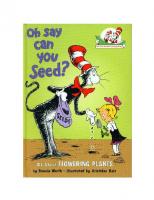
- Author / Uploaded
- Bonnie Worth
- Aristides Ruiz
Oh Say Can You Seed?: All about Flowering Plants
OH SAY CAN YOU SEED? All about FLOWERING PLANTS By Bonnie Worth – Illustrated by Aristides Ruiz From the giant gum tr
1,644 281 957KB
Pages 20 Page size 612 x 792 pts (letter) Year 2007
Recommend Papers
File loading please wait...
Citation preview
OH SAY CAN YOU SEED?
All about FLOWERING PLANTS By Bonnie Worth – Illustrated by Aristides Ruiz
From the giant gum tree to this very small weed, every flowering plant started out as a seed. Plants are so useful to me and to you. Can you think of the ways? I will name you a few. I’m the Cat in the Hat, and I think that you need to come and take a look at this thing called a seed.
The paper from books and the cloth for your pants came from trees and from cotton – that’s two kinds of plants.
The grains and the fruits and the veggies, you eat – why, they come from plants, too. And here’s something neat…
In deserts and woods and rain forests thick grow plants that can make you feel well when you’re sick.
Yes, plants serve us well and fill so many needs, and flowering plants all started as seeds.
Just what is a seed, you’re wondering maybe? Well, you might say a seed is a tiny plant baby!
Like all seeds a bean comes in three basic parts. Thing One and Thing Two, please bring on the charts. The best way for you to see just what I mean is to take a close look at a seed called a bean.
Part one is the first that I think you should know: it’s the part that’s the baby. It’s called em-bry-o!
To sprout, it needs food, like you and I do, which brings us to seed part numero two.
It’s called cot-y-le-don. Say, isn’t that fun? This bean seed has two, but some others have one.
Last comes the third part that you need to know. It’s the coat, which protects our cute bean embryo.
To sprout a bean seed, keep it moist, but not wet.
Keep it covered with dirt and then see what you get.
In seven or so days comes the part that I love:
a root spreads below and a stem shoots above.
Now in order to show a grown bean plant to you, we’ve traveled in time for some months. Maybe two.
Thing Two calls the part above ground the shoot system Thing one calls the part underground the root system.
To get a good look at the roots underground, it is better to look like a mole, I have found.
Roots are not pretty. They are twisty and hairy. And some roots look even a little bit scary! Roots anchor a plant and help it stand true. Roots suck up the water and minerals, too.
And roots keep the soil from just washing away. That’s pretty important, now wouldn’t you say?
It shoots through the plant, and next (as you’ll see) the leaves each turn into a good factory! We’ve talked about roots. We’ve learned about them. Now it is time we moved to the stem.
The stem is a pipe through which water shoots. It’s absorbed from the soil and passed up through the roots.
Just like the rhino’s protected with horns, the stem of the rose is protected with thorns.
Leaves come in all shapes and all sizes, I’ve found – some small and some spiky, some big and some round.
But the thing that all leaves have in common is this: they make their own food by pho-to-syn-the-sis. I’ll say this quite loudly – I don’t mean to be rude – but…
PLANTS ARE THE ONLY LIVING THINGS ON EARTH THAT MAKE THEIR OWN FOOD! To do this, plants need water, minerals – and sun. And that’s why the daytime’s when food-making’s done.
For your information – and also for fun – hop in my Shrink-Upper and let’s see how it’s done.
The leaves take the CO2 through a stoma, or pore. It works like a mouth, and that’s what it’s for. Then the air gets mixed in with the water and sun. And that’s how the food-making factory is run.
I see by my clock that now is the hour to drop in and say a hello to the flower! Plants breathe out a gas that we breathe in. The name of that gas is OX-Y-GEN
Thing Two has a chart he will share it with you – that shows what the parts of a flower all do.
In a pistil are ovules – they’re unfertilized seeds. The stamen holds pollen, which an ovule need.
An unfertilized ovule will not ever grow, and pollen’s the stuff that will fix that, you know.
(A flower’s own pollen or another’s okay.) That’s where the bees, play a role, by the way.
To make honey, bees need to get nectar from flowers. They fly and they gather this sweet stuff for hours.
The pollen sticks into their bodies and legs. It falls off and, sometimes, it reaches the eggs!
An ovule that’s fertilized becomes a seed. Around it grows fruit, upon which we feed.
And apples and oranges and pineapples, too – all kinds of plant foods that are healthy for you.
When we say the word “fruit,” do you know what it means? It means olives, nuts, grains, plantains, tangerines!
Some fruits are juicy and messy to munch on. Dry ones, like nuts are nice just to crunch on.
Not all plants with seeds give us edible fruit. Some plants have seeds that look weird or look cute. Bur seeds are hitchhikers that ride on your clothes And dandelion seeds sometimes fly up your nose.
Some seeds come in pods that explode like a sneeze. Other seeds may have wings and can fly on a breeze.
But whether they stick or they blow or they fly, seeds bring us life, and now you know why.
I see the sun setting and here comes the moon. Your mother is calling. Your dinner is soon.
I hope you have learned from my little seed talk. And how I will climb up…
…this giant beanstalk!









